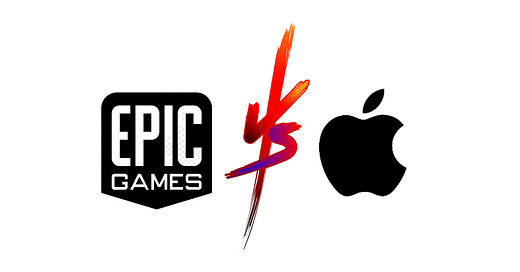The epic battle between Epic and Apple!
Why is the 30% commission on in-app purchases brutal, and what does Apple have to say?
The world is waiting for the final verdict on the most “epic” (pun intended) courtroom drama: The battle between a trillion-dollar omnipresent company, Apple, and a billion-dollar gaming giant, Epic Games.
The trial was going on in the US, but Epic has gone all in and sued Apple in the European Union and Australia as well! And a few days ago, the Australian Court accepted the case. Looks like the battle is no longer restricted to one continent.
Here’s the entire soup, in case you missed out!
Apple takes a 30% commission from all in-app transactions. Well, 30% is like a big deal. Fortnite (Epic Games' epic game) has been downloaded 133 million times and users have spent $1.2 billion on the App Store. That’s $360mn for Apple, just like that!
And it isn’t just the App Store. Google’s Play Store also charges 30% commission. But, purchases from the Play Store (~$10 million) were significantly lower than App Store.
Overall, Epic Games was not happy about it.
So in August 2020, it slyly worked a way around App Store’s and Play Store’s policy and started taking payments directly from the user, bypassing the tech giants' watch. Of course, Apple and Google got infuriated by Epic Games’ defiance. And they kicked it out from their stores.
This was how the battle-horns were blown.
Epic Games filed a lawsuit against Apple. It also released an advertisement, which was a parody of a path-breaking ad released by Apple in 1984. It became the underdog to win the favour of the masses. Here, watch both the ads:
Life came full circle for Apple, no?
Well, this whole controversy did not come out of thin air. Long before Epic Games executed the game plan, trouble had started brewing. Companies like Match Group (Tinder’s parent company), Spotify, and Netflix were already staging protests against App Store’s policy.
Now, let’s see what Apple had to argue:
> Apple has done a lot for Fortnite: since its debut in 2018, it sent out 500 million marketing communications to Apple’s users, placed a billboard in Times Square, provided it with the whole suite of developer tools. And, what did it even ask in return? $99/year and 30% commission.
> It has spent billions on creating an app ecosystem that has revolutionized the world. The number of apps in the app store grew from 500 at the start, to 1.8 million today. In 2019, it facilitated $138 billion in business. It has enabled the growth of so many businesses, including that of Fortnite. How can a growth conducive environment be monopolistic?
> Any Intellectual Property owner is not required to allow uncompensated use of its technology. Then why this ruckus, when Apple is taking its share?
> 80% of the app developers on iOS are not required to pay commission. Because they earn via advertisements, or they sell physical goods (where a commission is not required). So Epic is also free to adopt such a business model.
And so, it called Fortnite’s lawsuit a publicity stunt.
“By July 2020, interest in Fortnite had decreased by nearly 70% as compared to October 2019. This lawsuit (and the front-page headlines it has generated) appears to be part of a marketing campaign designed to reinvigorate interest in Fortnite… If Epic were truly concerned that it would suffer reputational injury from this dispute, it would not be engaging in these elaborate efforts to publicize it.”
(You can read the entire case made by Apple before the trial began here. Must say, it was very very moving. Highly recommended read).
Apple has created a ‘walled garden’. Inside the garden are all the Apple users. Anyone willing to get access to the garden is required to pay the cut. The question is, is such a system justified?
Judge Rogers, of the United States District Court, heard both sides of the cases in September before recommending a jury trial. Here’s what she had to say:
“Nintendo has had a walled garden. Sony has had a walled garden. Microsoft has had a walled garden. What Apple’s doing is not much different... It’s hard to ignore the economics of the industry, which is what you’re asking me to do.”
Now, what happened in the jury trial? Which side had a better argument?
Well, stay tuned and ReadOn.
Got some feedback or suggestion? Join us on WhatsApp list and keep ‘em coming!
PS: Humans operate the channel, and we reply to all messages :)





I have a doubt, can the cases between multi national corporation be filed in any court of any country or continent in which it is operating, or is their a restriction about it, if so what are the restrictions?